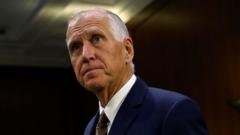Will Trump's Budget Jeopardize Millions' Healthcare in Senate Debate?

Understanding the Impact of the Latest Budget Bill in the US Senate
The recent budget bill making its way through the US Senate has ignited heated debates across the political spectrum. With estimated cuts to healthcare affecting nearly 12 million Americans and a potential increase in national debt by $3.3 trillion, the implications of this legislation are significant and far-reaching. This article delves into the essentials of the bill, the political maneuvering surrounding it, and its potential consequences for American citizens.
The Overview of the Budget Bill
The budget bill, often referred to as Donald Trump's "Big Beautiful Bill," aims to implement tax cuts and spending reforms. However, the Congressional Budget Office (CBO) estimates that if passed, the bill would lead to a staggering $1 trillion cut to healthcare funding. This figure raises alarms among both Democrats and some Republicans, as it threatens vital services relied upon by millions of Americans.
Key Components of the Bill
The bill encompasses several crucial elements:
- Tax Cuts: It proposes tax deductions on Social Security benefits and aims to eliminate taxes on overtime work and tips. The extension of tax cuts passed in 2017 is also a significant aspect of this legislation.
- Healthcare Funding Cuts: The CBO estimates cuts to Medicaid and other healthcare programs, which could severely impact vulnerable populations, including the elderly, disabled, and low-income Americans.
- Work Requirements: The legislation proposes imposing work requirements on most adults to qualify for benefits, particularly affecting Medicaid eligibility.
- Food Stamp Restrictions: The bill includes new restrictions on the food stamps program, necessitating proof of work for most adults with children aged 14 or older to qualify.
- Support for Rural Hospitals: In response to concerns from Republican senators, the bill increases the rural hospital relief fund from $15 billion to $25 billion to mitigate the adverse effects of healthcare cuts.
Political Dynamics at Play
The political landscape surrounding this bill is intricate, with both parties expressing strong opinions. The bill narrowly passed a preliminary vote, and party leaders are scrambling to secure support. The Senate currently holds a slim Republican majority, and the potential for defections complicates the path to a final vote.
Republican Perspectives
Notably, some Republican senators, including Thom Tillis of North Carolina and Rand Paul of Kentucky, have voiced reservations about the bill. Tillis, who announced he would not seek reelection after voting against the legislation, highlighted concerns that the proposed healthcare cuts would cost his state billions. Paul, on the other hand, opposes the bill due to its implications for the national debt.
Despite these criticisms, some Republican senators defend the bill as a necessary reform. Senator Markwayne Mullin of Oklahoma argued that the legislation aims to eliminate fraud and waste. He maintains that the bill's intent is to provide opportunities rather than foster dependency on government assistance.
Democratic Opposition
Democratic senators have been vocal critics of the bill, asserting that it disproportionately benefits the wealthy at the expense of vulnerable communities. Senator Mark Warner stated, "This is tax cuts for the wealthiest to end up cutting healthcare, plain and simple." Concerns over the bill's potential impact on millions of Americans have fueled Democratic efforts to delay its passage, including utilizing Senate rules to extend debate time.
The Economic Implications
As the debate continues, the economic ramifications of this bill cannot be overlooked. The CBO's assessment suggests that the bill will contribute significantly to the national debt, which has been a point of contention among lawmakers. Critics argue that adding $3.3 trillion to the debt is an irresponsible move, particularly as it coincides with cuts to essential services.
Healthcare Funding Cuts
The proposed cuts to healthcare funding raise substantial concerns among public health advocates and citizens alike. Medicaid, which serves as a lifeline for millions of low-income individuals, could face drastic reductions in funding. This is particularly alarming considering the growing need for accessible healthcare services in a post-pandemic world.
Tax Cuts and Wealth Distribution
The focus on tax cuts within the bill also raises questions about wealth distribution in the United States. While proponents argue that tax cuts stimulate economic growth, critics contend that benefits disproportionately favor the wealthy, increasing income inequality. The debate centers on whether the economic growth generated by tax cuts will adequately compensate for the funding cuts to critical social services.
Future of the Bill and Legislative Process
The journey of the budget bill is far from over. While the Senate has opened debate, the path to a final vote remains uncertain. The possibility of amendments adds another layer of complexity, as lawmakers seek to address concerns raised by both sides.
Amendments and Further Deliberation
As the bill progresses through the Senate, senators may propose amendments aimed at mitigating some of the more controversial aspects. These amendments could focus on preserving healthcare funding or addressing concerns related to the welfare system. However, any changes will need to balance the desires of party leadership with the demands of individual senators.
The Role of Public Opinion
Public opinion will likely play a crucial role in shaping the outcome of the bill. As citizens become more aware of the potential implications, grassroots movements and advocacy groups may mobilize to voice their concerns. Engaging the public in dialogue about the bill's impact on healthcare and social services is essential for fostering informed discussions.
Conclusion: The Stakes for Americans
The budget bill currently under consideration in the US Senate represents a pivotal moment in American politics, with far-reaching implications for healthcare, taxation, and national debt. As lawmakers navigate the complexities of this legislation, the stakes for millions of Americans are exceptionally high. The potential cuts to healthcare funding and the proposed work requirements raise profound questions about the future of social safety nets and the role of government in supporting its citizens.
As the debate unfolds, it is crucial for citizens to stay informed and engaged. The decisions made by lawmakers today will shape the landscape of American healthcare and economic policy for years to come. Will the final outcome reflect the needs of the people, or will it prioritize tax cuts for the wealthy at the expense of essential services? The answer will depend on the actions of lawmakers and the voices of those they represent.
Frequently Asked Questions
What are the main components of the budget bill currently in the Senate?
The budget bill includes tax cuts, healthcare funding reductions, work requirements for Medicaid benefits, and restrictions on the food stamps program. It also proposes increased support for rural hospitals.
How will the bill impact healthcare funding in the United States?
If passed, the bill is estimated to cut $1 trillion from healthcare funding, which could affect millions of Americans relying on programs like Medicaid.
What are the political implications of the budget bill's passage?
The political dynamics are complex, with both Republicans and Democrats expressing concerns. The bill's passage could hinge on securing enough support from Republican senators, given the slim majority in the Senate.
Why are some Republicans opposed to the bill?
Some Republicans, including Senator Rand Paul, oppose the bill due to its potential increase in national debt. Others, like Senator Thom Tillis, are concerned about the negative impact of healthcare cuts on their states.
What steps are being taken to delay the vote on the bill?
Democratic senators are utilizing Senate rules to extend the debate time on the bill, aiming to delay a vote and draw attention to the potential negative impacts of the proposed legislation.
As this pivotal moment unfolds in the Senate, what do you think should be prioritized in government spending and healthcare funding? #HealthcareDebate #BudgetBill #EconomicPolicy
Published: 2025-06-29 19:11:03 | Category: wales



